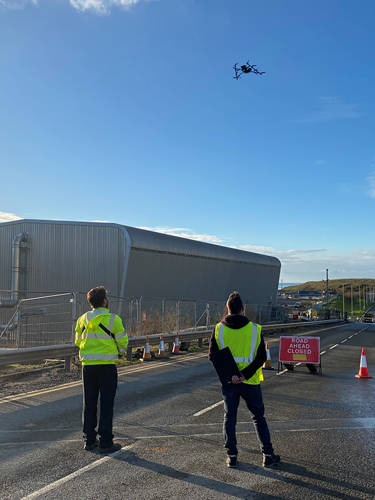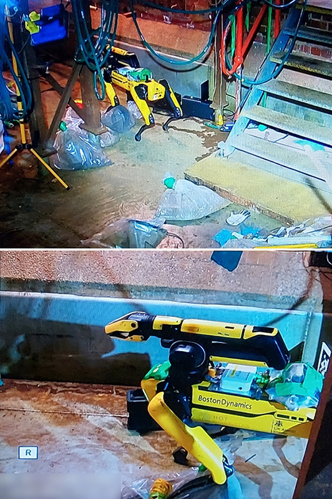The Office for Nuclear Regulation (ONR) is working with Sellafield Ltd on the deployment of robots and unmanned aerial vehicles (UAVs) on the Cumbrian site.
It is part of the licensee’s drive to accelerate hazard risk reduction through new and innovative approaches within the industry, which ONR supports.
 Sellafield Ltd workers operate a UAV on site.
Sellafield Ltd workers operate a UAV on site.The Nuclear Decommissioning Authority’s (NDA) has embraced a challenge of 'moving humans away from harm', with an aim of halving the number of high hazard decommissioning activities directly carried out by humans by 2030.
This would allow these employees to be deployed in less hazardous roles, including controlling robots and UAVs.
ONR recognises the opportunity this provides to reduce risk to Sellafield workers, as well as the need to develop appropriate regulatory processes that enable innovation.
Peter Allport, Head of Remote Technologies within Engineering & Maintenance at Sellafield, said: “UAVs have become an essential tool in supporting routine operations on the Sellafield site for both internal and external inspections.
“They have helped reduce the risk for our operators working at height and in difficult settings, and we have also been able to develop an augmented UAV capability that supports development and delivery across the NDA group.
 A robot retrieves data from an otherwise inaccessible area at Sellafield.
A robot retrieves data from an otherwise inaccessible area at Sellafield.“Recent robotics deployments in hazardous environments have proven extremely useful in collecting data from cells that were previously inaccessible to our operators at Sellafield and other sites across the NDA group.
“Robots have successfully entered these environments and moved material into areas where they can be accessed and processed through existing waste routes.
“Our application of UAV technologies sets a new precedent to remotely decommission hazardous environments and accelerate decommissioning programme milestones.”
To facilitate this innovation and ensure robust regulation, ONR has developed an engagement strategy that enables an open discussion about the technical challenges of deploying robots and UAVs.
The strategy provides guidance on ONR’s regulatory expectations and supports engagement in review exercises. Conclusions formed from the plan have been fed into regulatory guidance in areas including UK Conformity Assessed (UKCA) marking and proportional risk management.
ONR has worked to create a positive environment that enables open discussions with diverse stakeholders including academic institutions, research centres, licensees, national laboratories and other domestic and international regulators.
Paolo Picca, ONR’s lead on robotics and autonomous systems within the Sellafield Decommissioning, Fuel and Waste Division, said: “This engagement has offered a great opportunity for us to draw on different perspectives to achieve the safe and secure operation of innovative solutions at Sellafield.
“By engaging in an open and transparent manner, ONR and Sellafield Ltd managed to overcome a number of perceived blockers and clarify the regulatory position to enable the effective and safe deployment of these technologies”.
David Smeatham, ONR’s Head of Innovation, said: “It is great to see our enabling approach to innovation being used effectively, with behaviours in both Sellafield and ONR focused on making sure the benefits of innovation are realised while maintaining safety and security expectations”.
Melanie Brownridge, the NDA’s Technology and Innovation Director, said: “Collaboration is essential in deploying innovation to transform delivery of our mission. We support and welcome the early engagement on how best to trial and use novel technologies in an effective and safe way in line with our ‘Grand Challenges for Decommissioning’.”
Learn more about how ONR regulates innovation and ONR’s Sellafield programme.